Protecting our beloved pets from parasites is a fundamental aspect of responsible pet ownership. Fleas, ticks, and various types of worms pose significant health risks to both cats and dogs, potentially leading to discomfort, skin infections, anemia, and even life-threatening conditions. Finding the most effective Cat And Dog Flea And Worm Treatment can be a daunting task, given the multitude of options available. This guide aims to simplify the process by exploring popular and effective treatments, ensuring your furry companions stay healthy and parasite-free.
Understanding Fleas and Worms in Pets
Fleas are tiny, wingless insects that feed on the blood of mammals. Their bites cause intense itching, allergic reactions, and can transmit diseases like tapeworms. For dogs, unchecked flea infestations can also lead to secondary skin infections. can worms in a dog cause diarrhea. Ticks, on the other hand, are arachnids that latch onto pets and feed on blood, acting as vectors for serious illnesses such as Lyme disease, ehrlichiosis, and Rocky Mountain spotted fever.
Internal parasites, commonly known as worms, also present a grave threat. Hookworms and roundworms are frequently found in puppies and kittens, often transmitted from their mothers. These intestinal parasites can cause vomiting, diarrhea, weight loss, and stunted growth. Heartworms are particularly dangerous, spreading through mosquito bites and residing in the heart and lungs, causing severe organ damage and potentially fatal illness if left untreated. Understanding the life cycles of these pests and the diseases they carry is crucial for effective prevention and treatment strategies. can worms make a dog have diarrhea.
All-in-One Solutions for Dogs: Simparica Trio Chewable Tablets
For dog owners seeking a broad-spectrum preventative, Simparica Trio Chewable Tablets for Dogs stand out as an all-in-one solution. This monthly, prescription-only chewable tablet offers extensive protection against a wide range of parasites. It effectively treats and controls fleas, hookworm, and roundworm, while also tackling five different types of ticks, including the black-legged (deer) tick, brown dog tick, American dog tick, lone star tick, and Gulf Coast tick. Beyond external and intestinal parasites, Simparica Trio is vital for preventing heartworm disease.
The effectiveness of Simparica Trio comes from its three active ingredients. Sarolaner, an isoxazoline compound, targets fleas and ticks, helping to eradicate existing infestations on your pet and control home infestations within four to eight weeks when used regularly on all pets. Moxidectin provides robust protection against heartworm, while pyrantel extends the spectrum to include both adult and immature stages of two species of hookworms and two species of roundworms. This comprehensive coverage makes it a top choice for overall canine parasite prevention.
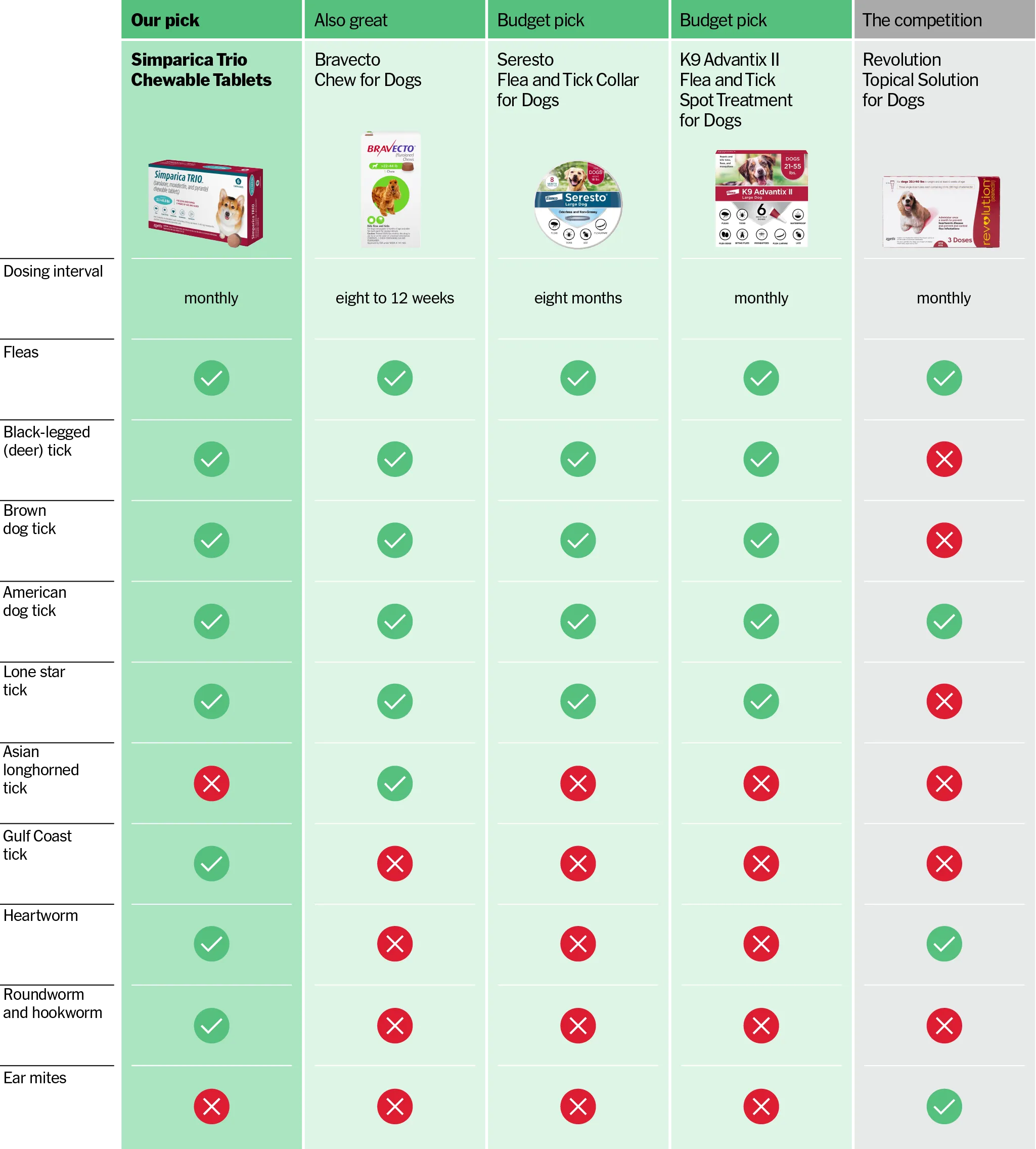 A chart comparing our treatment picks for dogs and the pests they help fight.
A chart comparing our treatment picks for dogs and the pests they help fight.
Simparica Trio is suitable for puppies eight weeks and older, weighing at least 2.8 pounds, and comes in various dosages for dogs up to 132 pounds. It can be given with or without food, making administration convenient. While it offers unparalleled protection, it’s important to consult your veterinarian to ensure it’s the right choice for your dog, especially if you reside in an area where specific ticks like the Asian longhorned tick are prevalent, as Simparica Trio is not currently labeled for this particular species.
Longer-Lasting Flea and Tick Control for Dogs: Bravecto Chew
Another excellent option for canine parasite prevention is the Bravecto Chew for Dogs. This treatment offers extended protection against fleas and certain ticks, lasting for up to 12 weeks with a single chew. Its infrequent administration makes it a convenient choice for busy pet owners. Bravecto is also noteworthy as it is one of the few products that kills the Asian longhorned tick, which can be a significant concern in some regions.
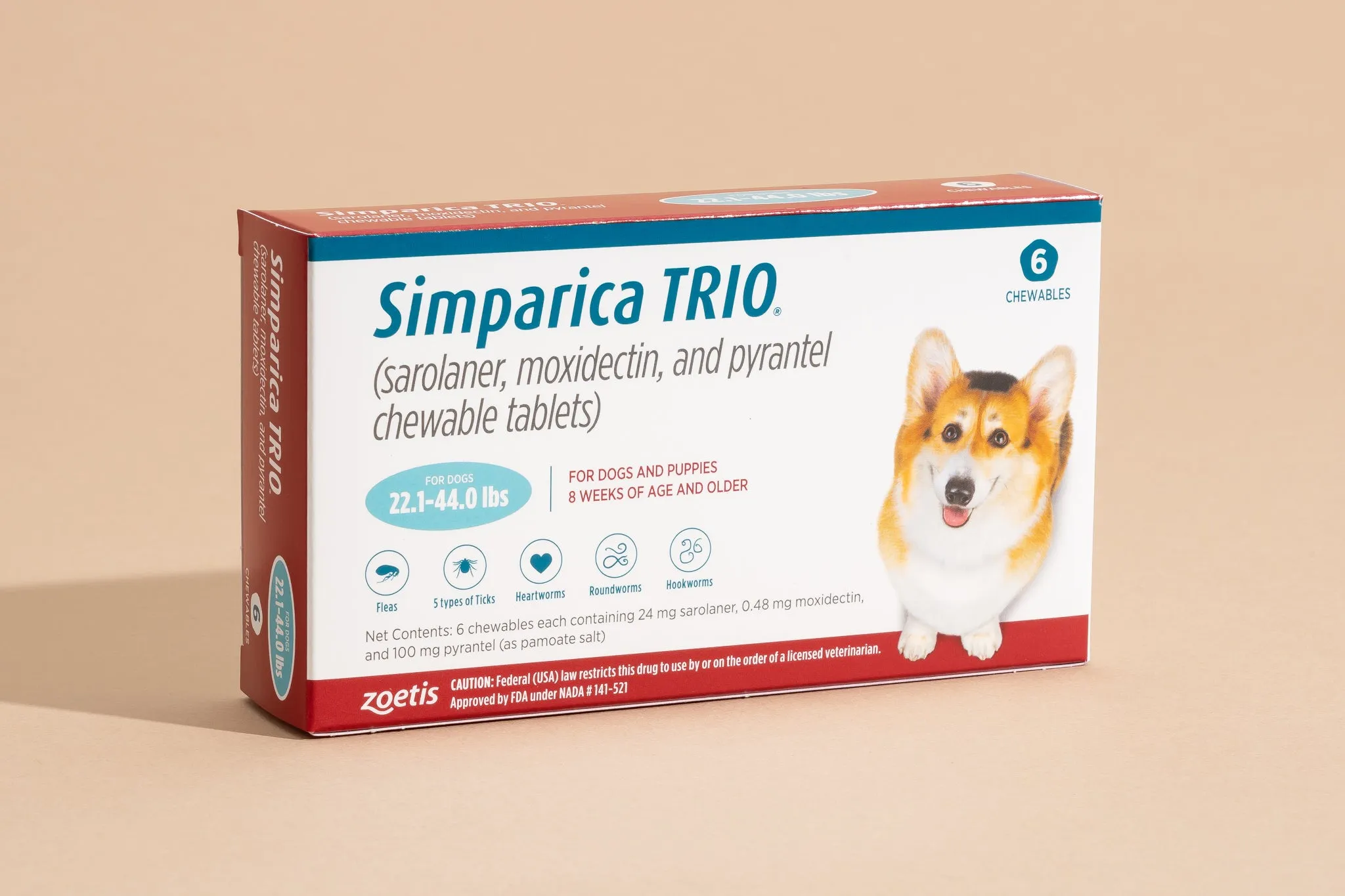 A box of Simparica Trio Chewable Tablet for Dogs.
A box of Simparica Trio Chewable Tablet for Dogs.
The active ingredient in Bravecto is fluralaner, another isoxazoline, which effectively controls flea and tick infestations by killing parasites that feed on your dog’s blood. While highly effective against external parasites, it’s crucial to remember that Bravecto does not contain ingredients for heartworm prevention or the treatment of hookworm and roundworm. Therefore, a separate product would be necessary to address these internal parasites. If you live in an area with a large population of lone star ticks, a more frequent administration every eight weeks might be recommended for full coverage. Bravecto Chew is available in multiple dosages for dogs weighing from 4.4 to 123 pounds and should be given with food.
External Parasite Protection: Seresto Collar and K9 Advantix II for Dogs
When it comes to repelling and killing external parasites, options like the Seresto Flea and Tick Collar and K9 Advantix II Flea and Tick Spot Treatment offer different approaches. These products are particularly useful for dogs spending a lot of time outdoors or in areas with high pest exposure.
Seresto Flea and Tick Collar for Dogs
The Seresto Flea and Tick Collar for Dogs provides long-lasting protection, killing and repelling fleas and ticks for up to eight months. Unlike oral treatments that require parasites to bite to ingest the medication, the Seresto collar releases active ingredients that spread over the dog’s skin and coat, killing pests on contact. This repellent action can significantly reduce the chances of ticks attaching and transmitting diseases within the critical initial hours.
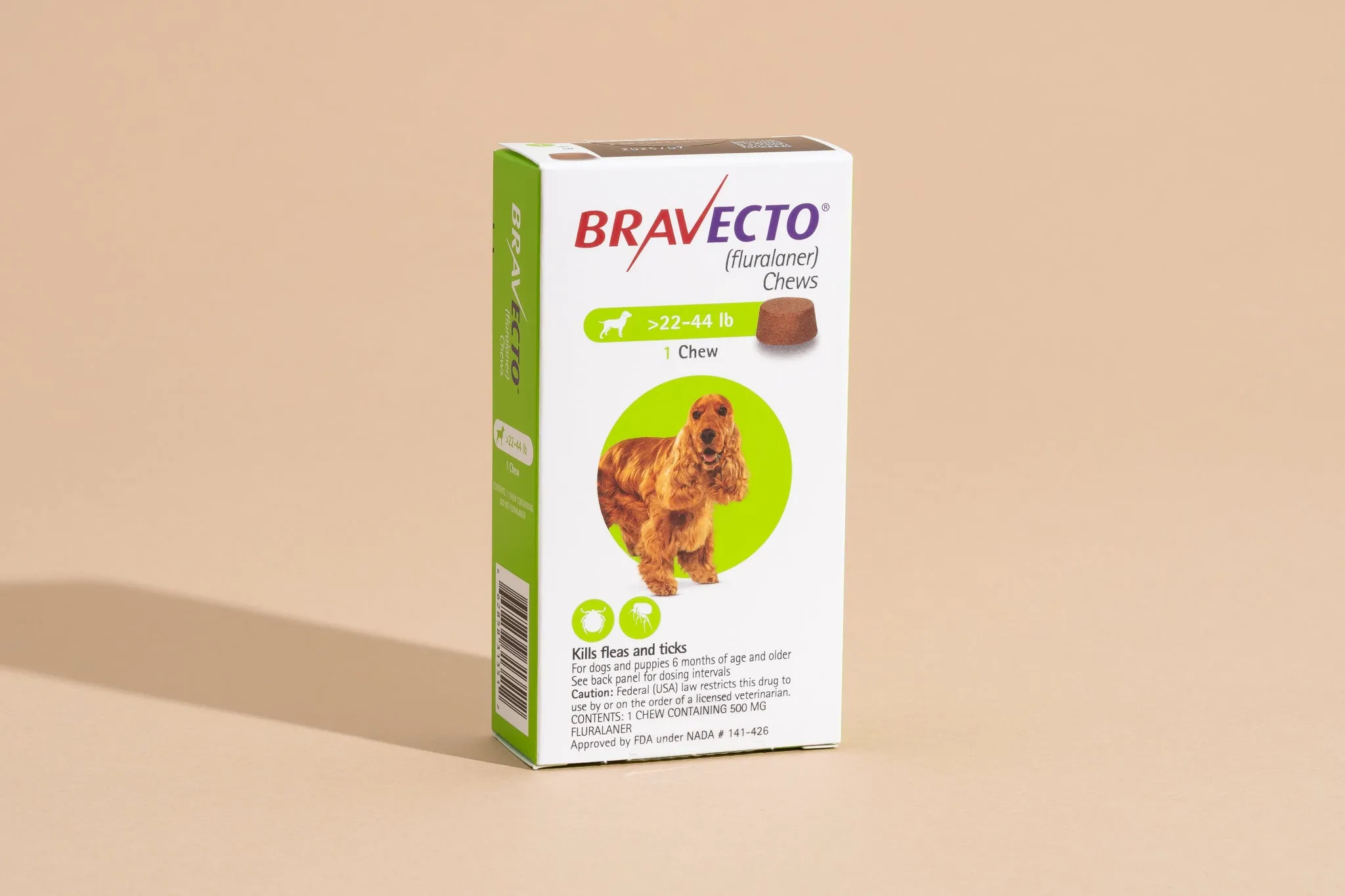 A box of Bravecto Chew for Dogs.
A box of Bravecto Chew for Dogs.
While the Seresto collar is highly effective against fleas, black-legged ticks, brown dog ticks, American dog ticks, lone star ticks, chewing lice, and sarcoptic mange, it does not offer protection against internal parasites like heartworm, hookworm, or roundworm. Therefore, it should be used in conjunction with a separate deworming and heartworm preventative. Available in two sizes, this collar offers a convenient, long-term solution for external parasite control, though some dogs may not tolerate wearing a collar for extended periods.
K9 Advantix II Flea and Tick Spot Treatment for Dogs
K9 Advantix II Flea and Tick Spot Treatment for Dogs is a monthly over-the-counter topical solution that both kills and repels fleas, ticks, and lice. A significant advantage of K9 Advantix II is its ability to also kill and repel biting flies and mosquitoes, which are carriers of heartworm disease and West Nile virus. This repellent action helps prevent these disease-spreading insects from biting your dog in the first place. best all wormer and flea treatment for dogs.
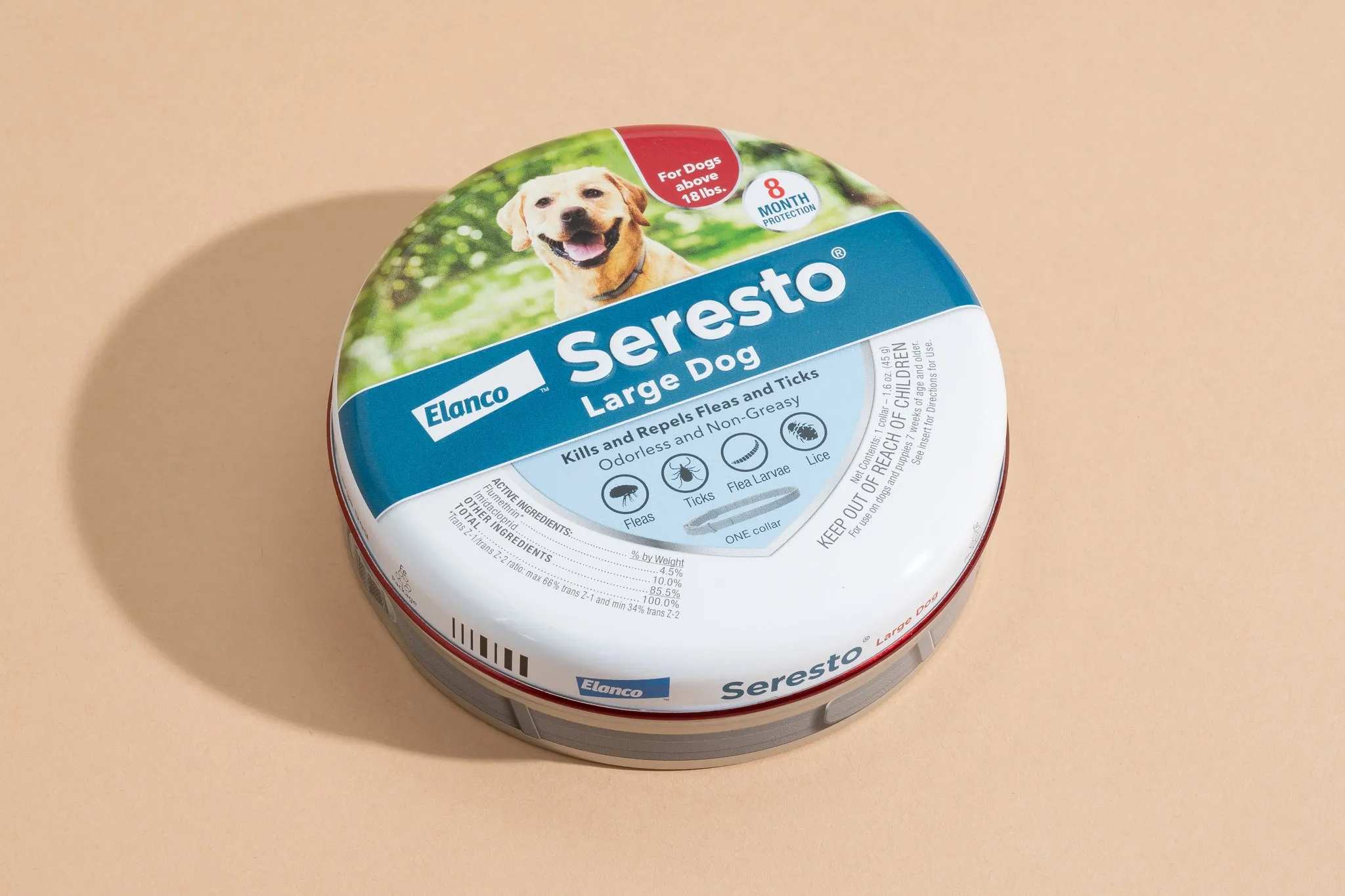 A tin containing a Seresto Flea and Tick Collar for Dogs.
A tin containing a Seresto Flea and Tick Collar for Dogs.
Similar to the Seresto collar, K9 Advantix II works on the surface of the skin and hair coat and does not enter the bloodstream. This means it will not prevent heartworm or treat intestinal parasites like hookworm and roundworm, necessitating a separate medication for these internal threats. It’s crucial to note that K9 Advantix II contains permethrin, which is toxic to cats in high concentrations. If you have both dogs and cats, treated dogs must be kept separated from cats for at least 24 hours post-application. The product is available in four dosages based on dog weight.
Essential Considerations for Cat Flea and Worm Treatment
While the treatments discussed above are highly effective for dogs, it is vital to emphasize that many dog parasite medications are not suitable for cats and can be severely toxic. Cats have unique physiological differences that require specific formulations. When considering cat and dog flea and worm treatment, always ensure you are using a product specifically labeled for felines.
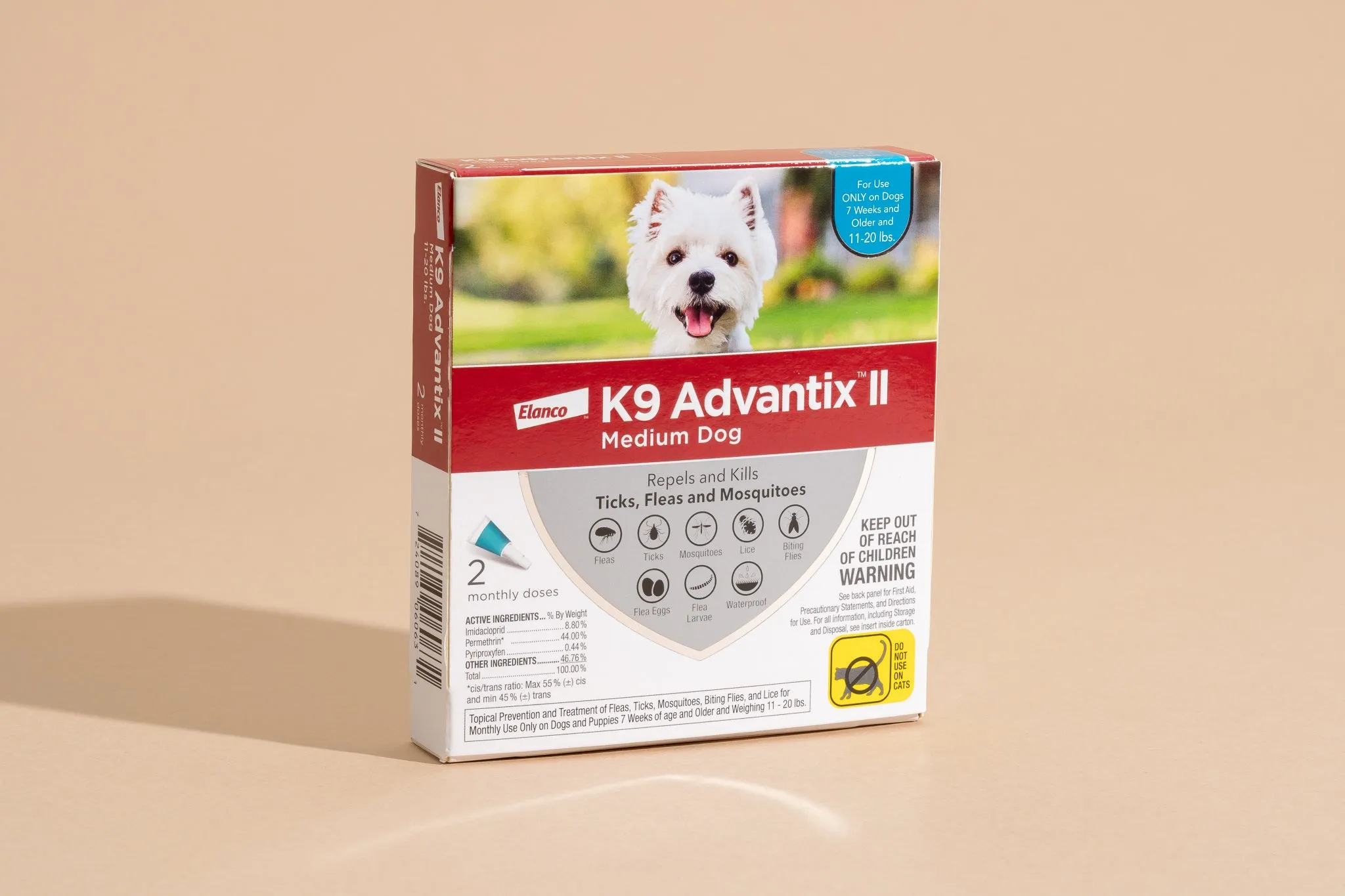 A box of K9 Advantix II Flea and Tick Spot Treatment for Dogs.
A box of K9 Advantix II Flea and Tick Spot Treatment for Dogs.
For cats, common flea and tick treatments include topical spot-ons, oral medications, and collars designed specifically for felines. Many effective cat treatments also offer broad-spectrum protection against internal parasites like hookworms, roundworms, and heartworms. Your veterinarian is the best resource for recommending appropriate and safe options tailored to your cat’s age, weight, lifestyle, and specific parasite risks. Never use dog medication on a cat, as it could have fatal consequences.
Choosing the Right Treatment for Your Pet
Selecting the optimal flea and worm treatment for your cat or dog involves considering several factors:
- Pet’s Species and Age: Always use species-specific products. Puppies and kittens have different needs than adult pets.
- Weight: Dosage is typically based on weight, so accurate measurement is essential.
- Lifestyle: Indoor pets may have different exposure risks than outdoor adventures.
- Geographic Location: The prevalence of certain parasites (e.g., specific ticks, heartworm) varies by region.
- Existing Health Conditions: Some medications may not be suitable for pets with certain health issues.
- Ease of Administration: Chewables, topicals, and collars offer different levels of convenience.
Ultimately, the best approach for comprehensive cat and dog flea and worm treatment is to consult with your veterinarian. They can provide a tailored recommendation based on your pet’s individual needs, health status, and local parasite risks, ensuring maximum protection and safety. home remedies for dog mites on skin.
Protecting your pets from parasites is an ongoing commitment that contributes significantly to their overall well-being and quality of life. By understanding the threats posed by fleas, ticks, and worms, and by choosing appropriate, veterinarian-approved treatments, you can ensure your beloved companions lead healthier, happier lives. Always remember that prevention is easier and safer than treatment, so maintaining a consistent parasite control regimen is key.
